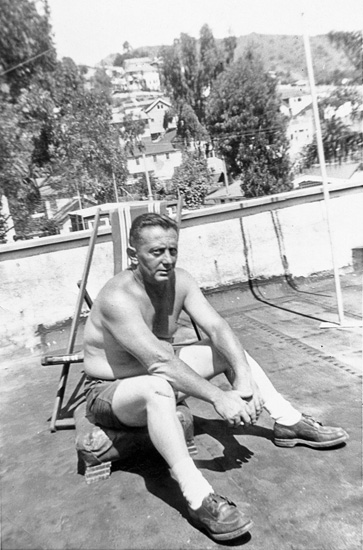
In 1959, John Fante developed diabetes. It would change his life. After a night of drinking with his pals Frank Fenton, Sherman Miller, and Jack Leonard (who would soon die from alcoholism), he reported the next morning for work at the studio and had his usual pie and coffee with two teaspoons of sugar for breakfast at the commissary. Then he passed out and fell off his stool.
At the hospital they didn’t know what was wrong with my pop. He was incoherent and on the verge of a coma. A day or so later, after tests came back, he and Joyce got the diagnosis.
My father took his disease seriously and within a week he was off booze. He remained sober, off and on, for the rest of his life.
When John Fante was no longer in the grip of the teeter-totter of alcohol and its massive sugar intake and withdrawal, his life took a positive turn. His daily spontaneous temper fits decreased. His children no longer scattered when they heard him enter the house.
“Accommodation” is the best word to describe what eventually happened between John and Joyce Fante. Maybe “peace treaty” is a more accurate term. Mom and Dad began to tolerate each other more openly and soon appeared to be outliving their differences. My mother possessed a “silent scorn” disposition similar to that of her own mother, Louise. Absent Pop’s habitual boozing, things inevitably got better. Mom seemed to have made a conscious decision, if not a religious one, to stop reacting and carrying grudges. She picked her battles more wisely. It saved their marriage.
Pop began coming home after work, and for the next few years, and until I left home, John Fante shape-shifted into more of a father in attendance than a volcanic, juiced-up, bipolar nut. He would never evolve into a nice guy and still couldn’t bring himself to attend any of my school events or graduations, but if he wasn’t working at the studio or playing golf he was almost always home, planting cacti or battling a succession of failing, high-priced power lawnmowers, often lapsing into a string of snarling curses when one of them would quit. And now that the house was calmer, Mom became more tuned-in and caring as a parent, but displays of affection from her toward her children continued to be rare.
Since there was a wide age difference between myself and my younger sister and brother—I was five years older than my sister Vickie and six years older than my brother Jim—we eventually came to understand that we’d had very different sets of parents. The newer versions of John and Joyce Fante were an evolution of the couple that had married years before, parented Nick and me, and then stopped speaking.
Despite the changes, my relationship with my father was one of fear and awe, and we continued to grow further apart as people. I worshipped him but was beginning to hate him. We spent less and less time together.
Pop once offered to pay me if I would read—five dollars a book. He told me to pick a book from our floor-to-ceiling bookcase in the living room. I found The Call of the Wild by Jack London. I liked the colors of the cover. He pulled the book down, then handed it to me. “This guy was a great writer,” he said. “Good choice.”
Sixty days later I had gobbled up five of London’s books. I was hooked forever.